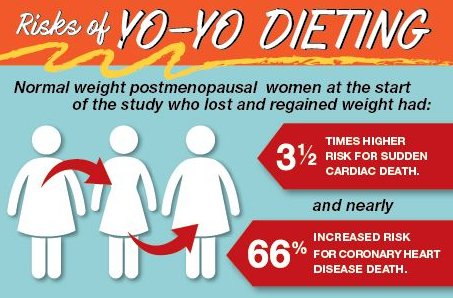The problem of dealing with yo-yo dieting that can lead you to obesity. We’ve all been there before you diet, take some weight off, then you slowly backslide.
Over 95 percent of dieters end up regaining all the weight and sometimes more over a five-year period.

But what happens when you become a yo-yo dieter going up and down over and over again, sometimes more than once a year?
A new study done on people who weight-cycled for a sport, such as weightlifting or wrestling, gained up to 5 BMI units by the time they were middle-aged.
Whether for athletics or to look better, this is a dangerous habit that can lead to obesity.
While there’s less to be done if you’re a weight-cycler for a sport (besides quitting the sport) there are a few things to try while dieting.
What are The Yo Yo Diet Effects?
The 5 percent of the population that has dieted and kept the weight off for five years or more say that having support was important to them.
1- Whether it’s your partner, encouraging you to make healthy decisions and being there for you, a group of friends, or an online group of dieters, make sure that you don’t go it alone.
2- Another tactic that’s been proven to be one of the most effective for keeping weight off is using a food journal. This keeps dieters accountable for whatever they are eating.
It can also help you see patterns throughout the days and weeks. Be sure not to leave anything off the list, even a handful of chips at lunch or a few pieces of candy.
There is no foolproof way to keep from regaining weight, but with these tips and a good amount of dedication, it will be more likely that those pounds you lost won’t come back on.
Crash Dieting Effects
I personally done crash dieting and as a result I’ve got anemia and my immune system got extremely low since then.
Dieting to lose weight should be in slow process and not in a crash dieting because that can cause harmful effects to your body.
There are many crashing diets available and you might loss weight in fast tract option but it will effects your health which might change your life forever.

The diet I’ve choose was as follow:
1- Day one, Only 2% milk all day
2- Day tow, Apple juice all day
3- Day three, One full chicken all day
Day four I passed out and woke up at the hospital because of low blood pressure and anemia which I’m still having problem with since then.
However, I don’t suggest any type of crash dieting because of my own personal experience which I’m still taking irons supplements since then and feel weak if I don’t take my medication.
Yo-Yo dieting is leading people to gain more weight and in many cases obesity as well.
Better to loss weight with changing the life style and diets and learn how to change the way of preparing food and exercise in regular basis.
Dieting May Start as Young as the Preteen Years
At any point in time, about one third, or 71 million, of adult Americans are dieting. With obesity becoming one of the most preventable health risks, it’s natural to want to do something about it. However, what you may not know is adults are not the only ones dieting – so are teenage and preteen girls.
A study of 2,000 girls aged 10 to 14 showed that up to a full third of them were dieting. Out of those, 10 percent were engaged in disordered eating behaviors. Dieting has already been shown to be a risk factor for a full blown eating disorder, and those who possess the characteristics of disordered eating are at an increased risk.
There is more pressure on young girls today to be skinny and athletic like the models they see in magazines. These images affect the way they look at themselves and their attitudes toward their own body.
This is also a time when romantic interests start and they want to look their best. Going through puberty can put on additional stress – the majority of girls who become anorexic do so at this time, possibly due to a natural increase in body fat.
It is clear that support from schools and families needs to start early in life, and girls need to be educated about eating disorders and related behaviors.
If you see warning signs in your child, think about talking to a professional, and give them plenty of support. The earlier these things are caught, the better it is for both you and your daughter.
Is the Cookie Diet too Good to be True?

There has been much talk lately about the Cookie Diet, but before you rejoice at the idea of eating delicious cookies all day in an attempt to stay slim, it is important to understand just how this new diet fad works.
Cookie Diet, created by Dr. Sanford Siegal, is actually an extremely low calorie diet based around the consumption of six specially manufactured cookies and a dinner consisting of six ounces of protein.
The entire day equals to only an 800 calorie intake. It would be nearly impossible not to lose weight on so few calories and successful dieters on the plan lose as much as 15 pounds a month.
Sceptics however are quick to cite how unhealthy overly quick weight loss can be. It is generally recommended to never go below 1200 calories a day in order to avoid the yo-yo diet effect where weight rapidly rises following a period of famine as the body looks to store a maximum of fat for fear of a new period without sufficient sustenance.
Then there is the lack of fruits, vegetables and many important vitamins and minerals in this eating method.
How do Cookie Diet dieters manage to eat so little without feeling hungry? Dr. Siegal says that the cookies used in the plan have been specially studied and prepared to suppress hunger.
Though no one is calling the chocolate, coconut or raisin flavored cookies delicious, they are packed with amino acids from such appetite suppressing proteins as found in oats, bran and whole wheat flour and seem to satisfy the hunger of some of the diet’s adepts.
Originally the cookies were only available to clients in Dr. Siegal’s Miami clinic. Recently they have become available in pharmacies and doctors’ offices across the United States, generating more buzz for the plan as potential dieters find the method more readily available in their area.
As with any diet method there are success stories though they never reflect the typical results. The essential, when choosing a diet, is for each person to find what works for him or her with the full knowledge of the benefits and risks involved.
Low Carb Diets – Do They Really Work?
Diets low in carbs, like the Atkins diet, have followers that rave about how quickly they are able to lose weight, and how much meat, cheese and butter they are allowed to eat. Indeed, on most low carb diets, there are no portion restrictions necessary. But will this diet work in the long term, and is it safe?
Low carb diets work by forcing your body to use its extra fat deposits for energy. When this occurs, the body produces something called ketones, which help the body flush out fat through your urine, a process called ketosis.
Weight is lost rapidly, simulating a “quick fix.” However, according to a study published in the Journal of the American Medical Association, only around 100 calories of fat escape the body through urine daily.
So where does this weight loss come from? It is mostly water that comes from breaking down muscle. So when the dieter grows tired of banning bread, pasta and sugar, the water loss will be quickly regained – and the weight will come back on.
In addition, carbohydrates are used by the body as a primary source of energy and supply glucose to muscle tissue.
This is necessary when you are planning to exercise, as you should always do on any diet to keep your metabolism elevated and to lose fat. If you are exercising on a low carb diet, you may not be providing your muscles with enough glucose and therefore may not have as much energy.
Overall, doctors and nutritionists agree that the best way to lose weight is to eat a healthy, balanced diet, with plenty of fruits and vegetables daily. If you reduce your portion sizes and exercise as well, you can’t go wrong.